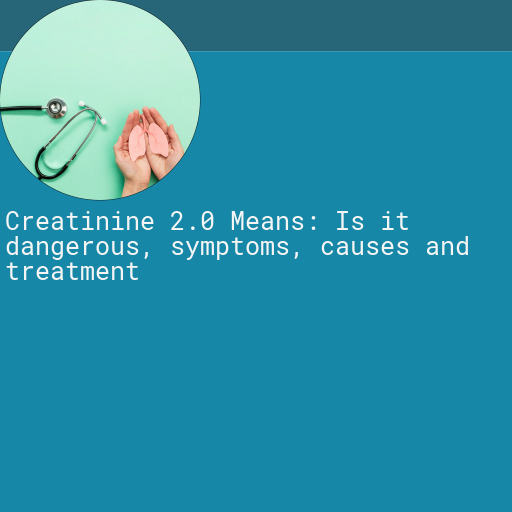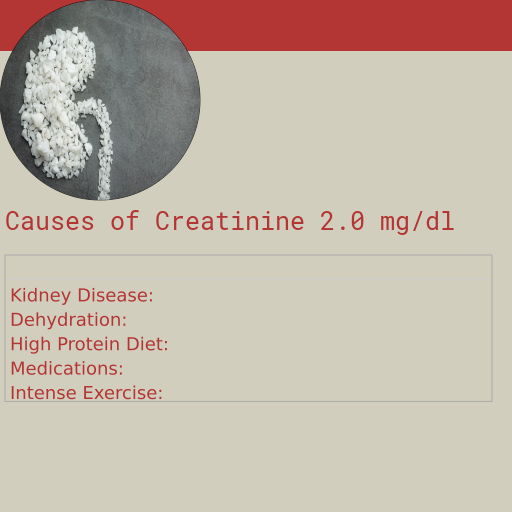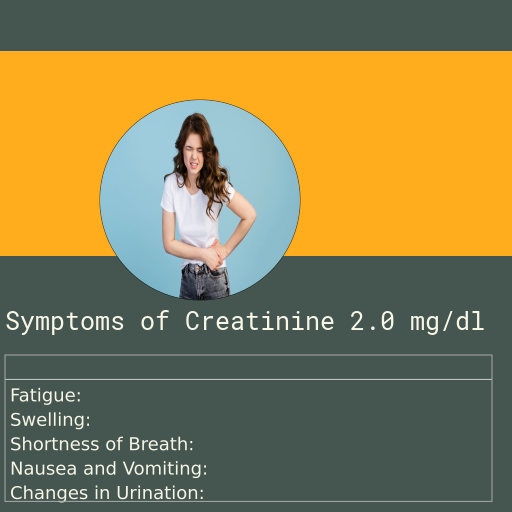Creatinine 2.0 : Is it Dangerous, Causes, Symptoms and More
When it comes to understanding your health, the term creatinine often surfaces in discussions about kidney function. A creatinine level of 2.0 can be a red flag, signaling potential health issues that require immediate attention. This blog delves into the dangers associated with elevated creatinine levels, explores the underlying causes, and highlights the symptoms you should be aware of. By gaining insight into these aspects, you can take proactive steps to safeguard your well-being and seek appropriate treatment when necessary.

What is Creatinine
Creatinine is a byproduct of protein breakdown in the muscles, and it serves as a waste product that the body needs to eliminate. Unlike nutrients and other essential compounds, creatinine has no use in the body. It is expelled primarily through the kidneys, making it a critical marker for assessing renal function. Elevated levels of creatinine can indicate that the kidneys are not working efficiently to filter out this waste product, which could be a sign of underlying health issues that require medical attention.
- Muscle Metabolism: Creatinine is a byproduct of muscle metabolism. The breakdown of creatine phosphate in muscles leads to the production of creatinine.
- Dietary Sources: Consuming red meat and other animal-based proteins can contribute to higher creatinine levels in the blood.
- Supplements: Taking creatine supplements can temporarily increase creatinine levels as the body processes the extra creatine.
- Renal Function: The kidneys filter creatinine from the blood. Impaired kidney function can lead to elevated creatinine levels.
- Exercise: Intense physical activity can increase muscle breakdown, thereby raising creatinine levels.
- Dehydration: Lack of sufficient fluid intake can concentrate creatinine in the blood, making levels appear higher.
- Medications: Certain drugs, such as nonsteroidal anti-inflammatory drugs (NSAIDs) and ACE inhibitors, can affect kidney function and creatinine levels.
Normal Range of Creatinine in Adults
The normal range of creatinine levels in adults can vary slightly depending on the laboratory and the method used for testing, but generally, for men, it falls between 0.6 to 1.2 milligrams per deciliter (mg/dL) and for women, it is slightly lower, ranging from 0.5 to 1.1 mg/dL. These values are considered indicative of healthy kidney function, as creatinine is a waste product generated from muscle metabolism and is normally filtered out by the kidneys. Deviations from this range could signal potential issues with kidney health, necessitating further evaluation and possibly medical intervention.
| Age Group | Normal Creatinine Range (mg/dL) |
|---|---|
| Infants (0-1 year) | 0.2 - 0.4 |
| Children (1-12 years) | 0.3 - 0.7 |
| Adolescents (13-18 years) | 0.5 - 1.0 |
| Adult Men (19-60 years) | 0.6 - 1.2 |
| Adult Women (19-60 years) | 0.5 - 1.1 |
| Older Adults (60+ years) | 0.6 - 1.3 |
Causes of Creatinine 2.0
Elevated creatinine levels in the blood can be a cause for concern, as they often indicate potential kidney problems or other underlying health issues. Creatinine is a waste product produced by the normal breakdown of muscle tissue, and it is typically filtered out of the blood by the kidneys. When the kidneys are not functioning properly, they may struggle to remove creatinine efficiently, leading to an increase in its levels. There are several causes of elevated creatinine levels, including chronic kidney disease, acute kidney injury, dehydration, and certain medications. Understanding the root cause is crucial for determining the appropriate treatment and management of elevated creatinine.
- Kidney Disease: Chronic kidney disease or acute kidney injury can significantly raise creatinine levels.
- Dehydration: Insufficient fluid intake leads to reduced kidney function and higher creatinine levels.
- High Protein Diet: Consuming large amounts of protein can temporarily increase creatinine levels.
- Medications: Certain drugs like NSAIDs, ACE inhibitors, and antibiotics can affect kidney function.
- Intense Exercise: Strenuous physical activity can cause a temporary rise in creatinine due to muscle breakdown.
- Heart Conditions: Congestive heart failure and other heart conditions can impair kidney function.
- Diabetes: Poorly managed diabetes can lead to kidney damage and elevated creatinine levels.
- Obstruction: Conditions like kidney stones or an enlarged prostate can block urine flow and increase creatinine.

Symptoms of Creatinine 2.0
When creatinine levels rise above the normal range, it may be indicative of underlying health issues. Elevated creatinine often signals problems with the kidneys, as they are responsible for filtering creatinine out of the blood. Common symptoms associated with high creatinine levels include fatigue, swelling in the lower extremities, shortness of breath, and changes in urination patterns. Recognizing these symptoms early can be crucial for diagnosing and managing potential kidney issues effectively.
- Fatigue: Elevated creatinine levels can lead to feelings of tiredness and lack of energy.
- Swelling: Noticeable swelling, especially in the face, hands, feet, and ankles.
- Shortness of Breath: Difficulty breathing may occur as kidneys struggle to maintain fluid balance.
- Nausea and Vomiting: A common symptom due to the buildup of waste products in the blood.
- Changes in Urination: Reduced urine output or changes in the color and consistency of urine.
- Confusion: Mental confusion or difficulty concentrating as a result of toxin buildup.
- High Blood Pressure: Elevated blood pressure can be both a cause and a symptom of kidney issues.
- Muscle Cramps: Painful muscle cramps due to electrolyte imbalances caused by impaired kidney function.

Dangers of Creatinine 2.0
While creatinine itself does not directly harm the body, elevated levels of this waste product often signal underlying health issues. A creatinine level of 2.0 or higher may indicate kidney dysfunction or other medical concerns requiring attention. When the kidneys are not functioning properly, they fail to filter out waste products efficiently, leading to the accumulation of harmful substances such as urea. This can result in various symptoms and complications, making it crucial to understand and address the root causes of elevated creatinine levels to maintain overall health and well-being.
- Kidneys: Elevated creatinine levels indicate impaired kidney function, potentially leading to chronic kidney disease (CKD).
- Heart: High creatinine can be associated with an increased risk of cardiovascular diseases and heart failure.
- Liver: While primarily a marker for kidney health, elevated creatinine may also reflect liver dysfunction.
- Muscles: Increased creatinine can result from muscle damage or conditions like rhabdomyolysis, leading to severe muscle pain and weakness.
- Gastrointestinal Tract: High creatinine levels can cause nausea and vomiting, disrupting normal digestive processes.
- Nervous System: Elevated creatinine can lead to a buildup of toxins, potentially causing neurological issues such as confusion and seizures.
- Skin: Poor kidney function associated with high creatinine can result in itchy skin and changes in skin color or texture.
- Blood: Elevated creatinine can be linked to anemia, as the kidneys produce erythropoietin, a hormone crucial for red blood cell production.
Home remedies for Creatinine 2.0
Disclaimer: Elevated creatinine levels are a serious medical condition that cannot be effectively treated at home. If you suspect your creatinine levels are high, it is crucial to seek immediate medical attention. Basic supportive care at home may include staying well-hydrated and maintaining a balanced diet, but these measures are not a substitute for professional medical evaluation and treatment. Always consult a healthcare provider for accurate diagnosis and appropriate treatment options.
- Hydrate adequately: Drinking plenty of water can help your kidneys function better and flush out toxins.
- Monitor your diet: Focus on a kidney-friendly diet, which includes low-sodium, low-protein, and low-potassium foods.
- Avoid NSAIDs: Over-the-counter pain medications like ibuprofen can be harmful to your kidneys, so it's best to avoid them.
- Exercise regularly: Engage in moderate physical activity to help manage blood pressure and improve overall kidney health.
- Track your blood pressure: Keeping your blood pressure in check can reduce the strain on your kidneys.
Treatment for Creatinine 2.0
When creatinine levels reach 2.0, it is crucial to seek medical treatment by a doctor to address the underlying causes and prevent further kidney damage. The primary treatment goals include stabilizing kidney function, discontinuing any harmful medications, and treating any existing infections that may be contributing to elevated creatinine levels. By focusing on these key areas, doctors aim to improve kidney health and prevent complications that can arise from high creatinine levels.
- Hydration: Increasing fluid intake can help dilute creatinine levels in the blood and support kidney function.
- Dietary Changes: A low-protein diet may be recommended to reduce the workload on the kidneys, as high protein intake can increase creatinine levels.
- Medications: Doctors might prescribe medications to manage underlying conditions such as hypertension or diabetes, which can affect kidney function.
- Dialysis: In severe cases, dialysis may be necessary to filter waste products, including creatinine, from the blood when the kidneys are not functioning properly.
- Lifestyle Modifications: Adopting a healthier lifestyle, including regular exercise and avoiding substances that can harm the kidneys, such as alcohol and certain medications, can help manage creatinine levels.
GFR with Creatinine of 2.0
The Glomerular Filtration Rate (GFR) is a crucial measure of kidney function, reflecting how well your kidneys are filtering blood. Unlike the absolute value of creatinine, which can vary based on age, sex, muscle mass, and other factors, GFR provides a more accurate assessment of kidney health. A high creatinine level might raise concerns, but without considering GFR, it can be misleading. GFR takes into account these individual differences and offers a comprehensive view of kidney performance, making it a more reliable and relevant indicator for diagnosing and monitoring kidney disease. By focusing on GFR, healthcare providers can better tailor treatment plans and predict outcomes, ensuring more effective and personalized care.
| Grade | GFR (Glomerular Filtration Rate) | Meaning |
|---|---|---|
| G1 | > 90 mL/min/1.73 m² | Normal or high |
| G2 | 60-89 mL/min/1.73 m² | Mildly decreased |
| G3a | 45-59 mL/min/1.73 m² | Mild to moderately decreased |
| G3b | 30-44 mL/min/1.73 m² | Moderately to severely decreased |
| G4 | 15-29 mL/min/1.73 m² | Severely decreased |
| G5 | < 15 mL/min/1.73 m² | Kidney failure |
What is my GFR for a creatinine of 2.0
| Age | Gender | GFR |
|---|---|---|
| 18 | male | 43.73 ml/m2 |
| 45 | male | 36.31 ml/m2 |
| 60 | male | 34.25 ml/m2 |
| 80 | male | 32.31 ml/m2 |
| 18 | female | 32.45 ml/m2 |
| 45 | female | 26.94 ml/m2 |
| 60 | female | 25.41 ml/m2 |
| 80 | female | 23.97 ml/m2 |
Table of danger posed by Creatinine 2.0 in male across different ages
| Age Group | Is Creatinne of 2.0 dangerous? |
|---|---|
| 25yrs - 95 yrs | bad, and could be dangerous, Consult a doctor |
Table of danger posed by Creatinine 2.0 in female across different ages
| Age Group | Is Creatinne of 2.0 dangerous? |
|---|---|
| 25yrs - 27 yrs | bad, and could be dangerous, Consult a doctor |
| 27yrs - 95 yrs | very high, Consult a doctor immediately |

Which other tests should be done for a creatinine value of 2.0?
When dealing with elevated creatinine levels, it's crucial to consider a comprehensive approach to kidney health by also conducting other important tests such as electrolytes, renal profile, and blood gas levels. These tests provide a broader picture of your kidney function and overall metabolic state. Electrolytes help measure the balance of minerals in your blood, which is vital for many bodily functions. The renal profile gives detailed insights into how well your kidneys are performing by evaluating various substances in the blood. Blood gas levels, on the other hand, assess how well your lungs can move oxygen into the blood and remove carbon dioxide from the blood, offering additional information about your respiratory and metabolic health. Together, these tests can help your healthcare provider develop a more accurate diagnosis and more effective treatment plan.
- Electrolytes: This test measures the levels of essential minerals like sodium, potassium, and chloride in your blood. Abnormal levels can indicate kidney dysfunction, dehydration, or other metabolic disorders.
- Renal Profile: A comprehensive renal profile includes several tests, such as blood urea nitrogen (BUN) and serum creatinine, to evaluate kidney function and detect any renal impairment.
- Blood Gas Levels: This analysis measures the amounts of oxygen and carbon dioxide in the blood, as well as blood pH. It is crucial for assessing respiratory and metabolic function, especially in critically ill patients.
- HbA1c: Hemoglobin A1c is a blood test that provides an average level of blood sugar over the past 2-3 months. It's particularly useful for diagnosing and monitoring diabetes, which can impact kidney health.
- LDH: Lactate Dehydrogenase is an enzyme found in almost all body tissues. High levels of LDH can indicate tissue damage, which might be related to kidney issues or other systemic conditions.
- Urea: Blood urea nitrogen (BUN) is another marker of kidney function. Elevated levels can suggest that the kidneys are not filtering waste products adequately.
- Liver Enzymes: Tests like ALT and AST measure liver function and can help identify liver diseases, which can sometimes co-exist with kidney problems.

 By: Dr.Bhargav Raut
By: Dr.Bhargav Raut